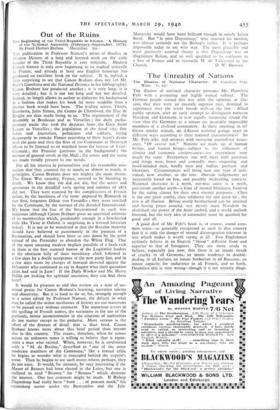Out of the Ruins
The Beginning of the Third Republic in France. A History of the National Assembly (February-September, 1871). By Frank Herbert Brabant. 'Macmillan. 25s.) THE publication in Professor Nannees series of Studies in Modern History of a long and learned work on the early months of the Third Republic is very welcome. Modern French history is only now beginning to to studied critically in France, and already at least one English historian has produced an excellent book on the subject. (It is, indeed, a little surprising to see that Canon Brabant does not list Mr. Bury's Gambetta and the National Defence in his bibliography). Canon Brabant has produced another ; it is very long, it is very detailed ; but it is not too long and not too detailed. Indeed, its length allows its author to elaborate his background in a fashion that makes his book far more readable than a shorter book would have been. The leading actors, Thiers, Gambetta, Jules Simon, the Comte de Chambord, the Duc de Broglie are thus made living to us. The organisation of the Assembly at Bordeaux and at Versailles ; the daily parlia- mentary trains that took the deputies from the Gare Saint Lazare to Versailles ; the population of the royal city, fine ladies and journalists, politicians and soldiers, trying desperately to remake France according to their heart's desire with the guns and then the fires of the Commune as theatrical effects to be listened to or watched from the terrace of Saint- Germain ; the Prussian garrisons in the background ; the menace of general revolt in the Midi ; the actors and the scene are made vividly present to oui minds.
For all his interest in personalities and his reasonable con- viction that they counted for as much, or almost as much, as principles, Canon Brabant does not neglect the main theme. The Great War casualty, France, seemed to be bleeding to death. We know that she did not die, but the actors and spectators in the dreadful early spring and summer of 1871 did not. They were stunned by the completeness of French defeat, by the harshness of the term:: imposed by Bismarck in that first, forgotten Diktat von Versailles ; they were terrified by the Commune, by the menace of the dreaded International. We know that the fear of the International as such was ludicrous (although Canon Brabant gives an uncritical estimate of its membership which, pardonable enough in a bewildered exile like Taine at Oxford, is surprising in a learned historian today). It is not to be wondered at that the Royalist majority should have believed so passionately in the panacea of a Restoration, and should have been so cast down by the great refusal of the Pretender to abandon the White Flag. One of the most amusing modem implicit parallels of a book rich in them is the first stunned horror of the Legitimist leaders at the obstinate folly of their hereditary chief, followed in a few days by a docile acceptance of the new party line, and in a few days more by charges of betrayal directed against the Orleanists who continued to say in August what their quondam allies had said in June! If the Daily Worker and Mr. Harry Pollitt are looking for spiritual ancestors, they can find them here!
It would be pleaiant to end this review on a note of un- mixed praise for Canon Brabant's learning, narrative talents and objectivity. But it is hard to do so, for, strangely enough in a series edited by Professor Namier, the defects in what may be called the minor mechanics of history are too numerous to be passed over without comment. The numerous errors in the spelling of French names, the variations in the use of the particule, minor inconsistencies in the citations of authorities do not matter except to the pedantic. More serious is the effect of the distrust of detail that is thus bred. Canon Brabant knows more about this brief period than anyone else in this country. The reader, therefore, when he comes across an unknown name is willing to believe that it repre- sents a man who existed. When, however, he is confronted with a " M. de Breslay," described as " one of the more moderate members of the Commune," like a textual critic he begins to wonder what is concealed behind the copyist's error. Then he begins to see such errors where, perhaps, they do not exist. It would, for instance, be very interesting if the Mayor of Rennes had been elected in the Loire, but one is inclined to read " Roanne " for " Rennes " which destroys the interest. One last comment might be made. If Bishop Dupanloup had really been " born . . . of peasant stock," his astonishing career under the Restoration and the July Monarchy would have been brilliant enough to satisfy Julien Sorel. But " le pore Dupanloup," who married his mother, was almost certainly not the Bishop's father. It is perhaps impossible today to say who was. The most plausible and most positively asserted theory is that Dupanloup was an illegitimate Rohan, and so well qualified to be confessor to a Son of France and to reconcile M. de Talleyrand to the


































 Previous page
Previous page